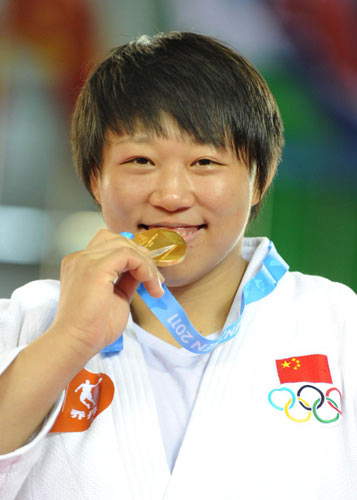Hosts China won three gold medals on the first day of the World University Games as action unfolded across swimming, judo, weightlifting, cycling and fencing.

Qin Qian of China celebrates after winning China's first gold medal at the 26th Summer Universiade in Shenzhen, Aug 13, 2011. [Photo/Xinhua]
South Korea, Ukraine, Japan and Italy each captured two gold medals to tie for second place in the medals standing, followed by France and Switzerland who had one gold apiece.
China's Qin Qian won back-to-back Universiade titles by edging South Korean Kim Na Young in the women's 78kg judo final.
"I think I deserved to win," said Qin, a 23-year-old student at the Civil Aviation University of China.
In contrast to Qin's effortless victory, weightlifter Xiao Hongyu survived a fierce battle in the women's 48kg final to earn China its second gold medal in the Universiade, which runs through Aug. 23.
Pensiri Laosirikul of Thailand took the early lead after managing to lift 82kg in the snatch section, with Nurdan Karagoz of Turkey lifting 81kg. Xiao and Ryang Chun Hwa of DPR Korea were a further 1kg behind to round out a tense opening section.
But Xiao was able to turn the table when she completed her final clean and jerk lift of 108kg to take her combined total to 188kg. Ryang took the silver medal with a total of 186kg, while Laosirikul collected the bronze with 184kg.
"I felt a little nervous at the beginning because of my hip injury," said the 20-year-old Xiao. "I was mentally strong, so I could do a good job in the clean and jerk. I was finally happy."
Lifter Li Zhili then made it two from two for China by winning the men's 56kg division.
The 24-year-old Chinese made his intentions known early, setting the bar at 120kg for his first lift in the snatch section - 17kg more that his opponents and finishing the snatch section an incredible 23kg ahead of his nearest rival, Tan Chichung of Chinese Taipei.
Li continued his dominance in the clean and jerk section, setting his first lift at 145kg - 9kg ahead of his nearest competitor. He duly made the lift to bring his combined total to 273kg and seal an enormous 34kg victory.
Italy dominated open water, which consisted of the 10km only, taking the first gold of the Universiade in the men's and gold and bronze in the women's race.
Simone Riffini of Italy won the men's race in 1 hour, 58 minutes, 0.74 seconds, more than two minutes faster than Russian Kirill Abrosimov, who edged Japan's Yusunari Hirai into third place. In the women's race, Rachele Bruni (2:06:49.31) slapped the finishing pad almost 40 seconds in front of Germany's Nadine Reichart and compatriot Alice Franco.
Franco credit climate training for their dominant performance in open water swimming's Universiade debut at Seven Star Bay.
"We train a lot in different locations around the globe," she said. "We also focus a lot on technique and swim about 20km each day. We are always looking to go faster and stronger."
In judo, Japan's Ryunosuke Haga won gold in convincing fashion in the men's 100kg category. The world junior champion had little difficulty advancing to the final, never needing the full five minutes to overcome his opponenents. Kim Soo Whan secured another gold medal for South Korea in the men's over 100kg.
A total of 17 gold medals are at stake on Sunday.
Bringing together around 8,000 athletes from 152 countries and regions, the Shenzhen Universiade is the biggest edition in the history of the event. It is open to student athletes between the ages of 17 and 28 who are still studying in university or have not been out of school for more than a year.
